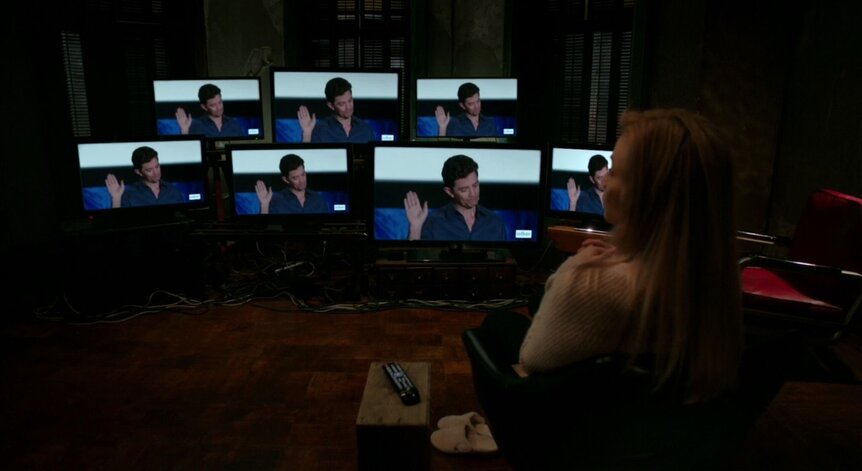Create a free profile to get unlimited access to exclusive videos, sweepstakes, and more!
How Elementary takes a Minority Report approach in its final season

What if you could catch a killer before they shed any blood? Science fiction has explored this particular hypothetical question in Philip K. Dick’s 1956 short story The Minority Report, which was then adapted by Steven Spielberg in 2002. In Minority Report, the Pre-Crime police department imprisons criminals before they can enact their plans, which is enabled by psychics knows as Pre-Cogs. Being able to foresee murders ensures that a premeditated act can be stopped before it occurs, but it is far from a flaw-free system as the Pre-Cogs occasionally have discrepancies in their visions. Just as the real justice system imprisons innocent people, so does the Pre-Crime unit.
In the final season of Elementary, Sherlock (Jonny Lee Miller) and Joan (Lucy Liu) come up against a tech titan who has gotten into the crime prevention business by taking a page out of the Philip K. Dick playbook. Odin Reichenbach (James Frain) is CEO of technology company Odker and the eighth richest man in America. He doesn't have a secret group of psychics at his disposal because he has the next best thing: access to over 500 million social media accounts, as well as search and purchase histories.
Employing a twisted version of utilitarian philosopher Jeremy Bentham’s “greatest good for the greatest number” to justify murder, it is as if Jeff Bezos, Bill Gates, Larry Page or Mark Zuckerberg decided to play judge, jury, and executioner. Instead of Pre-Cogs, Reichenbach has algorithms at his disposal, but his methods are just as flawed.
To get a meeting with Joan, Reichenbach makes a hefty donation to the gun buyback non-profit that Sherlock set up in his partner's name. He tells Joan he is skeptical of the efficacy of initiatives like this, which makes sense when he reveals his method for preventing mass unlawful acts. This introduction doesn't come until halfway through the final season, but Reichenbach is also to blame for the shooting of Captain Gregson (Aidan Quinn) in the Season 7 opener. Gregson was doing good old-fashioned police work investigating a murder when he was shot. He wasn’t an intended victim, however; his assailant was attempting to clean up a different mess.
Patrick Meers (Mac Brandt) had been hired by Reichenbach to kill a would-be ferry bomber. The reason why this person is identified as a potential threat is that his internet activity and purchases point to his grand deadly plan. One life sacrificed to save hundreds: that's how Reichenbach rationalizes his actions. Alternatively, he could have told the authorities, but that would expose his data-mining operation and deny him the opportunity to play God. When he hires Joan and Sherlock to investigate nonexistent kidnapping threats against his niece, he is testing to see if their methods include stepping outside the law. Reichenbach is pleased with the results, believing he has found like-minded people who will "do anything to protect an innocent person." However, there are lines the two detectives will not cross. Entering into a surveillance society dystopian universe is one of them. Killing someone before they have done anything wrong is another.
As with Pre-Cogs, there are flaws (or rather bugs) to Reichenbach's plan, as the words someone writes and the things people search don't mean they are necessarily going to become a mass murderer. Threats should be taken seriously without drastic measures, such as executions, being taken all in the name of doing good. However, this sadly an all-too timely storyline, particularly when factoring in the recent mass shootings and arrests that have been made in the last few weeks alone.For Sherlock and Joan, their methodical approach is used to determine how a criminal perpetrated crime, not to identify one before it is enacted. And unlike the Pre-Crime police department, Reichenbach isn’t just locking someone up. He is neutralizing a threat to the point of no return.
Nefarious schemes stemming from technological advances have been the subject of several episodes of Elementary before this final season. In "The View from Olympus," employees of ridesharing company Zooss take user data and manipulate it to their advantage. One resorts to blackmail, the other to stalk. In the Season 3 episode "Bella," artificial intelligence technology is considered a potential suspect to murder (but had been framed for the crime). Elementary isn't suggesting all advancements in this arena are bad, but nevertheless, there is often someone who will exploit it for personal benefit.
One of Sherlock’s sources of information is a hacker collective called Everyone (aka Anonymous) who carry out his computer and surveillance data requests as long as he fulfills an often humiliating task in return, such as the time they made him shave his hair. Sherlock is wary of what technology can do, but he also knows it is a helpful weapon in his investigative arsenal. Nevertheless, he would never bastardize it in the name of good as Reichenbach has.
Another group wielding technology to help further their cause is the NSA — Sherlock even goes so far as to refer to it as a criminal organization. Sherlock turns to the NSA when his options are limited, but in the case of Reichenbach, his frenemies are in bed together using all the power at the end of their fingertips to enact their plans. Surveilling society to the point where murders are committed before any crimes have occurred is a level of vigilante that Sherlock and Joan cannot endorse or sign up to be a part of. One of the people Reichenbach taps to become a killer on his payroll is a teacher who survived a school shooting. By telling her she could stop this from happening again, they prey on both her vulnerability and rage. Instead of preventing a tragedy, Annie Spellman (Kristen Bush) kills an innocent woman who stood in Reichenbach's way.
Sherlock agrees to look at any case in which Reichenbach isn’t 100-percent certain of someone’s intentions. When he stops a potential theater shooting, Reichenbah’s hit squad makes it look like this person killed his parents and then himself. In reality, they murdered all three to make it look like Sherlock didn't prevent a tragedy. Not only is the data fallible, but Reichenbach is arrogant enough to think he can control every aspect.
Basing whether someone should die on search history, internet ramblings, and purchases is beyond troubling — particularly when the figure playing judge, jury, and outsourcing the execution is not only at the controls of the software being used, but also has no sense of rehabilitation or even questioning the ethics of this endeavor. Crime procedurals often use the “ripped from the headlines” method of storytelling, and the overarching villain plot of Season 7 is drawing on this aspect with an element of the fantastic. Yes, threats made online should be taken seriously, but there are lawful methods of dealing with this issue.
"Simple solutions for complicated problems" is how Reichenbach refers to his company during a tech symposium during his introduction. It is also how he approaches his crime prevention program. The final season of Elementary addresses several topical concerns namely companies that violate terms of service for personal gain, tragic events that could have been prevented, and access to weapons. Stopping crime is, of course, preferable to having to solve one, however technology and Pre-Cogs can only do so much.
Reichenbach also quotes Leonardo da Vinci at one point, saying, "Simplicity is the ultimate sophistication." In a utopian society, being able to intervene and prevent tragedies would be easy. However, there is nothing simple about using technology to play God. Instead, it is a slippery slope to dystopian surveillance society straight out of a Philip K. Dick story.































